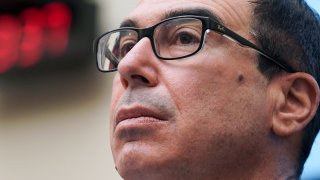
- The Trump administration began sending stimulus payments of up to $600 to millions of Americans on Tuesday evening as part of the recently passed Covid relief bill.
- Treasury Secretary Steven Mnuchin said the government would begin the process of mailing out paper checks on Wednesday for individuals without government-registered bank accounts.
- The deposits start as some in the Senate try to pass legislation that would increase direct payments in the year-end coronavirus relief package to $2,000.
WASHINGTON — The Trump administration began sending stimulus payments of up to $600 to millions of Americans as part of the recently passed Covid relief bill, the second such direct payment to Americans amid historic unemployment and business closures.
In a pair of tweets Tuesday evening, Treasury Secretary Steven Mnuchin said payments "may begin to arrive in some accounts by direct deposit as early as tonight." He also said the government would begin mailing out paper checks on Wednesday for individuals without government-registered bank accounts.
"These payments are an integral part of our commitment to providing vital additional economic relief to the American people during this unprecedented time," Mnuchin said in an emailed statement.
The second round of payments will be distributed automatically in the following breakdown: up to $600 for eligible individuals, $1,200 for couples filing jointly and up to $600 for each child. Similar to the first round of payments in March, the amounts begin to taper off after certain income levels.
"Generally, if you have adjusted gross income for 2019 up to $75,000 for individuals and up to $150,000 for married couples filing joint returns and surviving spouses, you will receive the full amount of the second payment," the Treasury Department said in a statement. "For filers with income above those amounts, the payment amount is reduced."
Money Report
Mnuchin told CNBC last week that Americans who qualify for direct payments could see those funds hit their bank accounts in a matter of days. But President Donald Trump delayed signing the Covid relief package, demanding $2,000 payments and criticizing the foreign aid funds included in an accompanying year-end funding bill. He finally signed the legislation on Sunday.
The bill also extended key unemployment benefits and allocated additional funding for small businesses. The last-minute rush to send stimulus checks reflects the gargantuan task facing the Trump administration in its final weeks.
The payments start as some in the Senate push to pass legislation that will increase direct payments in the year-end coronavirus relief package to $2,000. The House already approved a bill to do so.
Senate Majority Leader Mitch McConnell on Tuesday blocked Senate Minority Leader Chuck Schumer's attempt to unanimously pass a bill that would bump up the direct payments to $2,000.
The Kentucky Republican later Tuesday introduced a bill that would boost the size of the checks to $2,000 from $600, repeal Section 230 legal liability protections for internet platforms and create a commission to study election issues. The bill would meet all of Trump's recent demands, which are unrelated, but most likely will be blocked by Democrats.
— CNBC's Jacob Pramuk and Tom Franck contributed to this report.
Subscribe to CNBC PRO for exclusive insights and analysis, and live business day programming from around the world.






